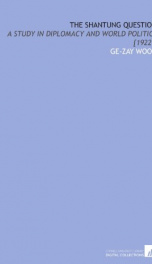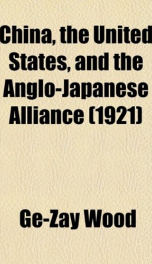the chino japanese treaties of may 25 1915

Purchase of this book includes free trial access to www.million-books.com where you can read more than a million books for free. This is an OCR edition with typos. Excerpt from book: VII DURESS AS A GROUND FOR ABROGATION ABOVE all the arguments for the abrogation of the Chino-Japanese treaties of 1915, there is one which is legally weak, but morally unanswerable. It has been frequently pointed out that China yielded to the Twenty-one Demands under the menace of an ultimatum, and that the resulting treaties were, therefore, entered into under duress. For this reason, it has been urged, the treaties of 1915 are void. In fact, that is the ground upon which the Chinese delegation at the Peace Conference at Versailles had based its claim for the abrogation of the Chino- Japanese treaties of 1915, which were regarded as a proper subject for consideration by the peace conferees. The treaties in question should be abrogated, it was urged, "because they were negotiated in circumstances of intimidation and concluded under the duress of the Japanese ultimatum of May 7, 1915." This argument is technically weak, it is to be admitted. It is, however, morally strong, and one which is quite unanswerable. It furnished the reason why the Chinese Government, as pointed out in a previous chapter, consented to the transfer of the German leasehold to Japan without doing anything to repudiate it first. THE CHINO-JAPANESE TREATIES 77 Those who dissent from the argument of the Chinese delegation at the Versailles Peace Conference are quite right, and we are perfectly willing to share their view in the matter to a great extent. For, according to the best authorities of International Law, and according to the established international usage, all sovereign States are equal, and one is as strong as the other, and in their diplomatic dealings there is nothing to speak of as "duress" which can be taken as a valid ground for the abrogation of international agreement. The only ...
Info about the book
Author:
Series:
Unknown
ASIN:
110305239X
Rating:
4.5/5 (1)Your rating:
0/5
Languge:
English
Users who have this book
Users who want this book
What readers are saying
What do you think? Write your own comment on this book!
write a commentif you like the chino japanese treaties of may 25 1915 try:
Other books by this author
Do you want to read a book that interests you? It’s EASY!
Create an account and send a request for reading to other users on the Webpage of the book!




